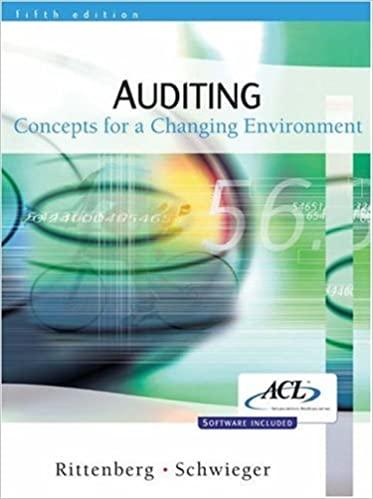Question
Which of the following enabled Congress to have the ability to levy taxes on income, from whatever source derived? A: The Sixteenth Amendment B: The
- Which of the following enabled Congress to have the ability to levy "taxes on income, from whatever source derived?"
A: The Sixteenth Amendment
B: The Internal Revenue Code of 1939
C: The Ninth Amendment
D: The Revenue Act of 1913
- Samantha and Drew are married with a 25-year-old son who lives in their home. He is single and they provide over half of his support. During the vear he had a part time job where he earned $3,300. Their son is not a full-time student. Their son can/cannot be claimed as a dependent because:
A: He can be claimed because he is a qualifying relative.
B: He cannot be claimed because he fails the gross income test.
C: He cannot be claimed because he is over 19 and not a full-time student.
D: He can be claimed because he is a qualifying child.
- Which of the following is generally excluded from gross income?
A: Partnership income
B: Dividends
C: Rewards
D: Municipal bond interest
4. Oscar and Mary have no dependents and file a joint income tax return for 2019. They have adjusted gross income (all wages) of $140,000 and itemized deductions of $30,000. What is the amount of taxable income that Oscar and Mary must report on their 2019 income tax return?
a. $93,600
b. $116,000 Oc. $110,000
d. $140,000
e. $102,000
5. During 2019, Murray, who is 60 years old and unmarried, provided all of the support of his elderly mother. His mother was a resident of a home for the aged for the entire year and had no income. What is Murray's filing status for 2019, and how many dependents should he report on his tax return?
a. Head of household and 1 dependent
b. Single and 2 dependents
C. Head of household and 2 dependents
d. Single and 1 dependent
e. None of these choices are correct.
6. John, age 25, is a full-time student at a state university. John lives with his unmarried sister, Ann, who provides over half of his support. His only income is $4,300 of wages from a part-time job at the college book store. What is Ann's filing status for 2019? O
A. Single
b. Qualifying widow(er)
c. Head of household
d. Married, filing separately
e. None of these choices are correct.
7. Which of the following must be included in the gross income of the recipient?
a. Child support payments
b. Gifts
c. Welfare payments
d. Royalties
e. All of these choices are included in gross income.
8. Which of the following is generally excluded from gross income?
a. Partnership income
b. Rewards
c. Disability benefits
d. Dividends
e. None of these choices are correct.
9. Mary received the following items during the current year: Christmas bonus from her employer $600 Christmas gift from her father $100 Unemployment compensation $35 What is the total amount of the above items that must be included in Mary's current year gross income?
a. $135
b. $635
c. $100
d. $600
e. $0
10. In 2019, Uriah received the following interest payments: Interest of $300 on an overpayment of 2018 Federal income taxes Interest of $400 from his bank certificate of deposit. Interest of $1,000 on municipal bonds Interest of $1,500 on US savings bonds (Series HH) What amount, if any, should Uriah report as taxable interest income on his 2019 individual income tax return?
a. $700
b. $2,200
c. $0
d. $3,200
e. None of these choices are correct.
Step by Step Solution
There are 3 Steps involved in it
Step: 1

Get Instant Access to Expert-Tailored Solutions
See step-by-step solutions with expert insights and AI powered tools for academic success
Step: 2

Step: 3

Ace Your Homework with AI
Get the answers you need in no time with our AI-driven, step-by-step assistance
Get Started


